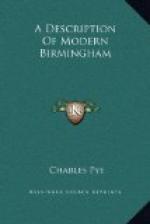Here are eight musical bells, the two trebles being fixed in 1558; the sixth has an inscription, “William Comberford, lord of this manor, gave this bell, 1623.”—“On the seventh is, Sancta Bartholomew, ora pro nobis.” And on the tenor is inscribed, “I will sound and resound to thee, O Lord, to call thy people to hear thy word.”
The church yard is of considerable extent, and being in such an elevated situation, those who profess to delineate panoramas may here find ample scope to display their abilities; for there is not only a view of the following churches, but the towns and villages wherein they are situated, are several of them under the eye of the spectator from this lofty eminence, viz. Walsall, Willenhall, Darlaston, Wolverhampton two churches, Bilstone, Sedgley, Dudley, two churches and the ruins of the castle, West-bromwich, Tipton, Wednesfield, Brierly-hill, and Rushall; in addition to the above, by ascending the roof of the church, you command Birmingham and Aston, together with numerous engines that are at work in its vicinity; the whole when combined form such a rich and variegated scene as probably cannot be equalled in any other situation.
In the vicinity of Wednesbury there are numerous mines of coal, wherein great numbers of people are employed, whilst others pursue the different branches of gun-making; springs, steps, and other articles used by coach-makers, are also manufactured here, together with wood screws, hinges, and of late, apparatus for the gas lights.
In the year 1742, when the methodists were spreading their doctrines through the kingdom, some disturbances took place here on that account; and soon after, Mr. Wesley, the preacher, was waited upon by Sir John Gonson, one of the Middlesex justices, who notified to him that he and his brethren had received orders from above to do justice to him and his friends, whenever they should make application; his majesty being determined, that no man in his dominions should be persecuted for conscience sake. Posterity will scarcely credit, that in Britain, and at so late a period as 1742, justice was not to be obtained but by an order from court; and that such order was issued, reflects infinite credit on the sovereign, George 2d, who commanded it. This mandate was not by any means premature; for it became absolutely necessary, to quell the increasing tumults. In Staffordshire, the populace rose upon their employers, from whom they demanded money, and if that was not complied with, they threatened to serve them as they had done the methodists. A quaker, when riding through Wednesbury, was attacked by them, pulled from off his horse, and dragged to a coal pit, where it was attended with difficulty to prevent their throwing him in. This gentleman, not being so much attached to his principles as to refuse the protection of the law, prosecuted them at the assizes, which caused those tumults to subside in Staffordshire.
Darlaston.




